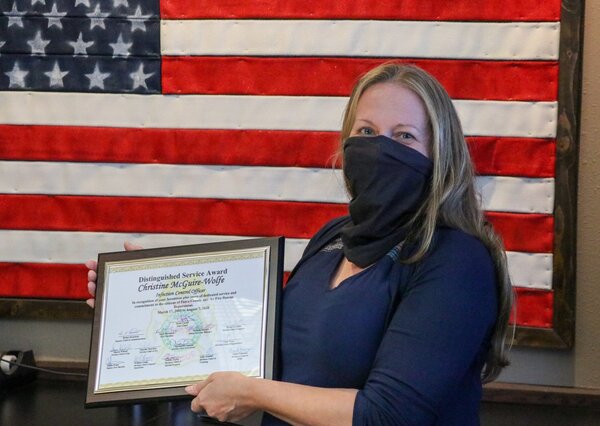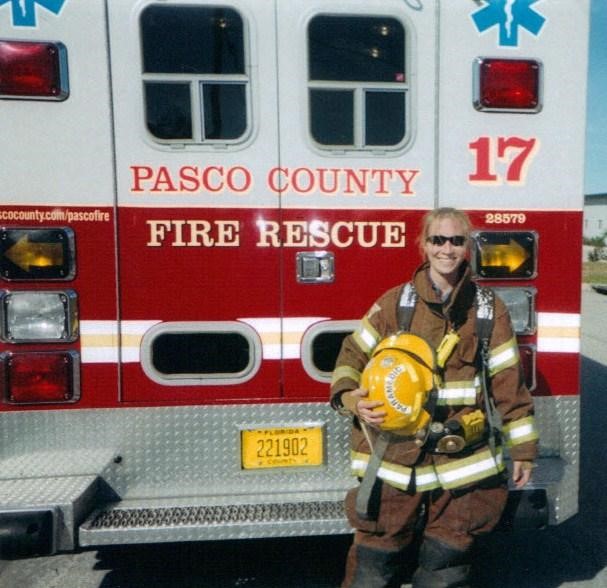Dr. Christine McGuire-Wolfe honored for advocating for firefighter health and safety
As an emergency responder and infection control officer with Pasco County Fire Rescue (PCFR) for the past 17 years, Dr. Christine McGuire-Wolfe said she will always keep certain calls close to her heart.
“You interact with people on their worst days and also see the best of humanity in action,” she said.
McGuire-Wolfe, who earned her PhD in public health with a concentration in global communicable disease from the USF College of Public Health (COPH), retired from PCFR in August and has now joined the COPH as an assistant professor.
Upon her retirement, PCFR awarded her the distinguished service award—their highest commendation awarded to employees who retire in good standing and who served with exemplary and honorable service.

“It really was unexpected—administration had blocked my calendar for the awards ceremony as a ‘transition meeting’ to reassign my job duties,” she said. “Over the years, mentors that I respected the most retired and received this award, so it is an honor that my command staff chose to confer it to me.”
During her career with the PCFR, McGuire-Wolfe designed and expanded infection control efforts to protect the health and safety of paramedics and EMTs actively engaged in providing patient care.
“In the beginning, crew members tended to be skeptical about the benefits of participating in screening and vaccination programs and reporting work-place exposures,” she said. “As the program’s credibility grew, crews respected the recommendations issued and participation rates increased exponentially.”

McGuire-Wolfe helped to successfully mitigate two large potential outbreaks using what she said were, “common public health approaches that were unusually proactive for the fire service.”
The first of those was addressing an intrusion of bats in the dorm rooms of a fire station and the need for rabies prophylaxis for the crew members that had slept in those rooms; the other halting the spread of Hepatitis A—which began with one firefighter unknowingly working several shifts with Hepatitis A, exposing a total of 101 firefighters.
“Approximately 80 percent of these firefighters were previously unvaccinated for Hep A and required timely post-exposure vaccination,” she said. “In addition, several symptomatic firefighters were screened for the virus and station disinfection protocols were implemented.”
She became known throughout PCFR for her efforts advocating to improve firefighter health and safety, something she said she will always be proud of.
“The professions of firefighting and emergency medical services, as well as Pasco County Fire Rescue, have made significant gains toward incorporating a culture of safety in the workplace, but there are still critical pieces in this approach that need to be strengthened, including infection control,” she said. “Healthy firefighters, paramedics, and EMTs more effectively serve their communities.”
She said the safety of the workers is something that is even more so important during the COVID-19 pandemic.
“Emergency responders who have access to appropriate personal protective equipment in sufficient quantities are less stressed about providing patient care in the midst of a pandemic,” she said. “To the citizenry and to the fire service and EMS, COVID-19 has demonstrated the need for prevention and the potential for widespread consequences when preventative measures are not implemented appropriately. Efficient infection control practices for crews and on ambulances ensures that emergency response crews are not, unintentionally, transmitting COVID-19 within the community.”
McGuire-Wolfe, who originally joined the COPH in 2013 as an adjunct faculty member, moved into an assistant professor role in 2020.
“I am grateful to be part of the thriving infection control program at COPH and look forward to incorporating real-world examples of infection control dilemmas, interventions, and successes into the classes that I teach,” she said.
Story by Anna Mayor, USF College of Public Health
